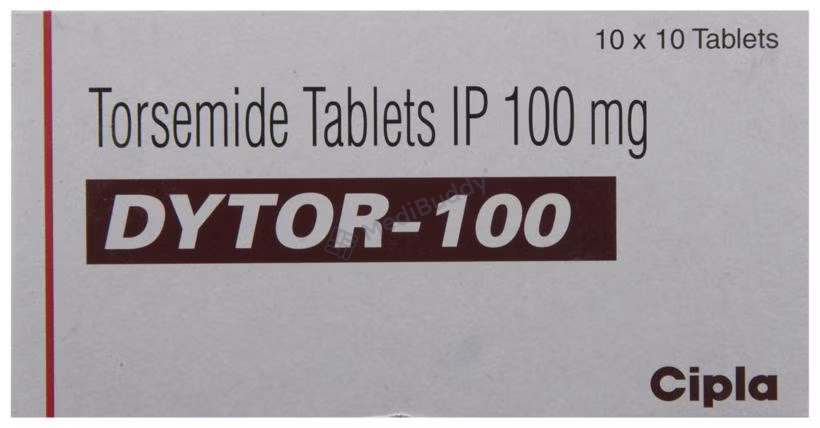Dytor 100 Tablet
By Dytor
Rx
10 Tablet in a Strip

Composition
Torasemide(100mg)

Manufacturer - Cipla Ltd
Cipla House, Peninsula Business Park, Ganpatrao Kadam Marg, Lower Parel, Mumbai-400013

Expires on or after
May, 2027

liver
When using Dytor 100 Tablet, it is important to be cautious if you have liver disease. Patients with liver issues may require a dosage adjustment for Dytor 100 Tablet. It is crucial to consult your doctor before taking this medication to ensure the proper dosage and monitoring for any potential side effects related to liver health. Additionally, if you have a history of liver diseases or conditions, special care should be taken when using Dytor 100 Tablet, as sudden changes in electrolyte balance can lead to hepatic coma. Always seek medical advice and guidance when considering these medications if you have liver concerns.

kidney
Dytor 100 Tablet is generally safe for use in patients with kidney disease. Inform your doctor if you have kidney issues, as caution is advised if unable to pass urine or if kidney damage is medication-induced. For Dytor 100 Tablet, caution is recommended for those with a history of kidney diseases; dose adjustment may be needed based on current kidney status.

alcohol
It is advisable to avoid alcohol while taking Dytor 100 Tablet as it may lead to unwanted side effects. Please consult your doctor for guidance on alcohol consumption with this medication.

driving
It is not safe to drive if you feel sleepy, dizzy, or have vision issues while taking Dytor 100 Tablet. Avoid driving to prevent accidents.

pregnancy
Dytor 100 Tablet is usually safe during pregnancy based on animal studies. Limited human data is available. Yet, for Dytor 100 Tablet, avoid use in pregnancy unless vital. Consult your doctor if pregnant or planning. Benefits should outweigh risks.

breastfeeding
Dytor 100 Tablet is considered safe during breastfeeding as limited data shows no significant risk to the baby. However, use Dytor 100 Tablet in nursing mothers only if necessary and when benefits outweigh potential risks.
| Habit Forming | No |
| Chemical Class | Sulphamoyl derivatives |
| Therapeutic Class | CARDIAC |
| Action Class | High-ceiling Diuretics (Inhibitors of Na+-K+- 2Cl cotransport) |
₹508.4
Inclusive of all taxes
Content verified by

Dr. Gowri Kulkarni
MBBS - General Medicine, DNB - Psychiatry, MRCGP [INT] Family Medicine, BSIC (BACP)
Last update on 18-Nov-2024












